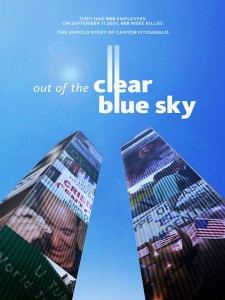 At the start of the work day of September 11, 2001, it was business as usual for the employees of Cantor Fitzgerald, one of the world’s largest traders of US Government bonds. The firm occupied the top floors, 101-105, of the North Tower of the World Trade Center, so far up, they were above the clouds and could watch the weather change before anyone on the earth. On that morning, Howard Lutnick, the CEO of Cantor Fitzgerald, was dropping off his son to his first day of school. At 8:46 AM, the first hijacked plane of the 9/11 terrorist attacks struck the North Tower. 658 Cantor Fitzgerald employees, including Lutnick’s younger brother, Gary, died from the attack. Lutnick’s story and the efforts of Cantor Fitzgerald to take care of the families of the fallen friends and colleagues is the basis of Danielle Gardner’s thought provoking documentary, Out of the Clear Blue Sky.
At the start of the work day of September 11, 2001, it was business as usual for the employees of Cantor Fitzgerald, one of the world’s largest traders of US Government bonds. The firm occupied the top floors, 101-105, of the North Tower of the World Trade Center, so far up, they were above the clouds and could watch the weather change before anyone on the earth. On that morning, Howard Lutnick, the CEO of Cantor Fitzgerald, was dropping off his son to his first day of school. At 8:46 AM, the first hijacked plane of the 9/11 terrorist attacks struck the North Tower. 658 Cantor Fitzgerald employees, including Lutnick’s younger brother, Gary, died from the attack. Lutnick’s story and the efforts of Cantor Fitzgerald to take care of the families of the fallen friends and colleagues is the basis of Danielle Gardner’s thought provoking documentary, Out of the Clear Blue Sky.
Gardner, who lost her own brother in the twin tower attacks, uses archive footage, home video recordings, dramatic recreations, and interviews to tell the story of how this devastated company that lost 2/3 of their staff survived when all seemed lost. Just days after the attack, Lutnick had to make decisions on how to keep the company running when they no longer had offices of the man power to run. They borrowed heavily just to be prepared for when the stock market reopened on September 17, 2001. Lutnick tried to do the right thing by promising the families of Cantor Fitzgerald victims that the company would take care of them, even though the company didn’t have the money. He appeared on TV, sobbing during interviews with the major news outlets. He became the face of corporate America and he quickly received the goodwill and support of the rest of the nation.
Gardner, who lost her own brother in the twin tower attacks, uses archive footage, home video recordings and interviews to tell the story of how this devastated company that lost 2/3 of their staff survived when all seemed lost. Just days after the attack, Lutnick had to make decisions on how to keep the company running when they no longer had offices of the man power to run. They borrowed heavily just to be prepared for when the stock market reopened on September 17, 2001. Lutnick tried to do the right thing by promising the families of Cantor Fitzgerald victims that the company would take care of them, even though the company didn’t have the money. He appeared on TV, sobbing during interviews with the major news outlets, and became the face of corporate America. Lutnick quickly received the goodwill and support of the rest of the nation.
However, to keep the company alive, the company had to cut the victims from the company payroll. Even though he pledged to pay victims families donate 25% of the company’s profits for five years and cover their health care for ten years, angry families and the media pounced on Lutnick, branding him as heartless and a liar. Despite all of this, Lutnick and the company forged on. He found a way to communicate with the families and show them that he was committed to doing the right thing.
Gardner’s film is a straightforward chronicle of the early months of Cantor Fitzgerald’s recovery and Lutnick’s efforts to remain true to his promises. She never tries to manipulates during the film; the stories we hear throughout the documentary are sad enough that she doesn’t need to try and make you cry. Besides the efforts of the company, she also details the relief fun and charitable foundation that Cantor Fitzgerald created to help families of 9/11.
If Lutnick comes across as a little too polished in his interviews, it’s because he’s been telling his story for 10 years and mastered it. A self-made man who lost his parents at an early age and had to help raise his brother, Gary, Lutnick is an accomplished public speaker and at ease in front of the camera. One look at the mess he became when speaking to Larry King or Connie Chung right after the attacks, and it’s no question that this guy really cares. Out of the Clear Blue Sky chronicles the lives of the Cantor Fitzgerald survivors over the course of ten years. By the film’s conclusion, 2011, the firm had fulfilled its commitment.
http://www.youtube.com/watch?v=YmwY3iRVopU





Comments